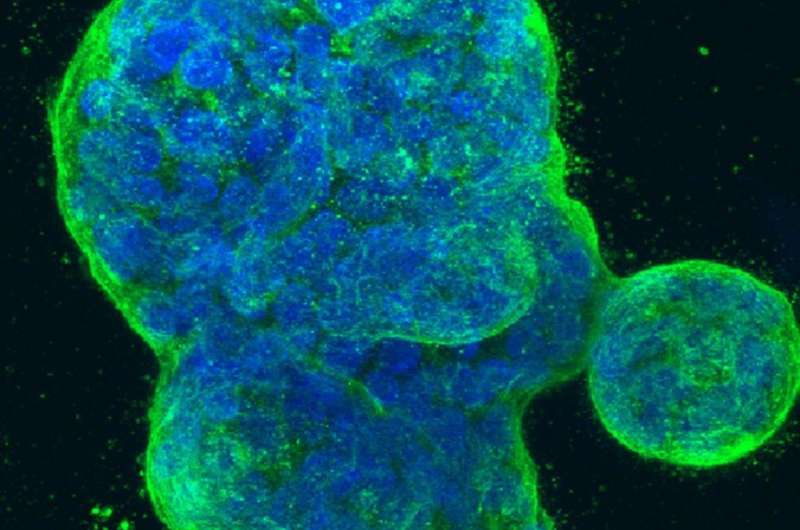This article has been reviewed according to Science X's editorial process and policies. Editors have highlighted the following attributes while ensuring the content's credibility:
fact-checked
peer-reviewed publication
trusted source
proofread
Study: Novel small molecule 5D4 disrupts several molecular pathways that lead to cancer growth

Researchers at Baylor College of Medicine have identified a small molecule named 5D4 that can suppress the growth of breast and ovarian cancers in animal models. 5D4 works by binding to TopBP1 protein in cancer cells, disrupting its interactions with several pathways that promote cancer growth. Combining 5D4 with another cancer inhibitor, talazoparib, enhances the effectiveness of the anti-cancer activity.
The study, published in the Proceedings of the National Academy of Sciences, strongly supports continuing the investigation toward further developing this strategy for clinical use.
"Cancer development involves many steps of genetic alterations and signaling pathway deregulation. About 10 years ago, our team discovered that protein TopBP1 is at a convergent point of multiple cellular pathways involved in cancer growth and progression, making it a potential candidate for targeted cancer therapy," said corresponding author Dr. Weei-Chin Lin, professor of medicine-hematology and oncology and of molecular and cellular biology at Baylor. He also is a member of Baylor's Dan L Duncan Comprehensive Cancer Center. "Our idea was to identify molecules that would bind to TopBP1 and interfere with its interactions with molecular pathways that promote cancer growth."
Lin and his colleagues report in the current study that years of progressive work screening more than 200,000 compounds followed by multiple rounds of structure-based compound optimization have finally produced fruits. They have discovered that 5D4 can bind to and effectively inhibit TopBP1 from stimulating several cancer-promoting molecular pathways. Importantly, 5D4 can inhibit MYC activity in cancer. MYC has been known to be very difficult to target. Their finding may open a new avenue to target MYC indirectly with TopBP1 inhibitors.
"The TopBP1 protein has multiple parts or domains that serve diverse functions within cells. 5D4 inhibits specific domains within TopBP1 that are involved in cancer progression without interfering with the protein's normal function in cell replication. The domains that 5D4 targets are responsible for regulating E2F1, mutant p53, MYC and a process called homologous recombination. Thus, 5D4 shows anti-cancer activity without toxicity to normal tissues," Weei-Chin Lin said.
"We also found that combining 5D4 with other compounds such as PARP inhibitors, highly enhances the anti-cancer effect. Taken together, our findings strongly support the potential use of TopBP1inhibitors as a targeted cancer therapy."
"It's very exciting to have found a TopBP1 inhibitor that really stops cancer growth in cells and in animal models in the lab," said first and co-corresponding author Dr. Fang-Tsyr Lin, associate professor of medicine-hematology and oncology at Baylor and member of the Dan L Duncan Comprehensive Cancer Center. "Our next step is to continue developing this compound for human testing, to optimize its anti-cancer effect in combination with other inhibitors and to minimize potential toxicities."
Kang Liu, Lidija A. Wilhelms Garan, Helena Folly-Kossi, Yongcheng Song and Shwu-Jiuan Lin also contributed to this work. The authors are affiliated with Baylor College of Medicine or Taipei Medical University.
More information: Fang-Tsyr Lin et al, A small-molecule inhibitor of TopBP1 exerts anti-MYC activity and synergy with PARP inhibitors, Proceedings of the National Academy of Sciences (2023). DOI: 10.1073/pnas.2307793120





















